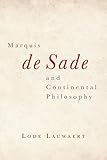Marquis de Sade and Continental Philosophy / Lode Lauwaert.
Material type: TextPublisher: Edinburgh : Edinburgh University Press, [2022]Copyright date: ©2019Description: 1 online resource (232 p.)Content type:
TextPublisher: Edinburgh : Edinburgh University Press, [2022]Copyright date: ©2019Description: 1 online resource (232 p.)Content type: - 9781474430692
- 9781474430715
- online - DeGruyter
| Item type | Current library | Call number | URL | Status | Notes | Barcode | |
|---|---|---|---|---|---|---|---|
 eBook
eBook
|
Biblioteca "Angelicum" Pont. Univ. S.Tommaso d'Aquino Nuvola online | online - DeGruyter (Browse shelf(Opens below)) | Online access | Not for loan (Accesso limitato) | Accesso per gli utenti autorizzati / Access for authorized users | (dgr)9781474430715 |
Frontmatter -- Contents -- Acknowledgements -- Introduction -- 1. Godlessness, Purity and Simulacra -- 2. The Terror of Writing -- 3. Apathy, Energy and Transgression -- 4. Ethics and Modernity -- 5. Sadism as Formalism -- 6. Literature and the Clinical -- Conclusion -- Notes -- Bibliography -- Index
restricted access online access with authorization star
http://purl.org/coar/access_right/c_16ec
Reads six interpretations of de Sade in French post-war philosophy: Klossowski, Blanchot, Bataille, Lacan, Barthes and DeleuzeHe might be best known for sex and violence, but Lode Lauwaert shows that the Marquis du Sade sits at a crossroads of surprisingly disparate branches of western culture: abstract art, Tom and Jerry, gnosticism, Kant’s moral philosophy, romanticism, scholasticism, stoicism and more. To explore these links, Lauwaert reads six interpretations of Sade in French postwar philosophy – looking specifically at Pierre Klossowski, Maurice Blanchot, Georges Bataille, Jacques Lacan, Roland Barthes and Gilles Deleuze.Lauwaert shows how these interpretations of de Sade can be read as a lively introduction to a postmodern way of thinking that is often considered inaccessible, but which dominated the French intellectual scene after the Second World War. This perspective takes the subject away from the centre of the universe and sees it as an expression of a non-human force. And that helps us to better understand contemporary thinkers such as Catherine Malabou and Quentin Meillassoux.Key FeaturesFocuses on the philosophical reception of de Sade in the years after the Second World WarWill also appeal to those working in postmodernism, literary theory, critical theory, cultural studies and psychoanalysis
Mode of access: Internet via World Wide Web.
In English.
Description based on online resource; title from PDF title page (publisher's Web site, viewed 29. Jun 2022)


